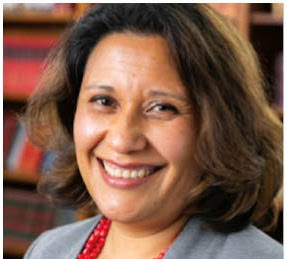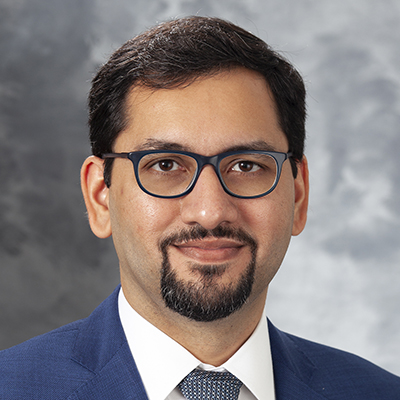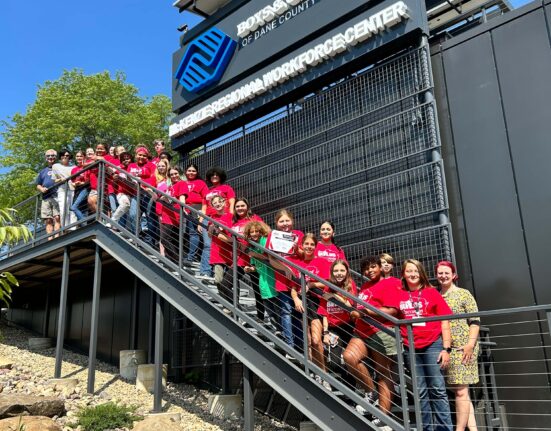
As Kaba Bah describes it, the real estate business “runs in my bloodline.” Born in West Africa, Bah’s childhood was shaped by his parents’ hard work. They owned a small grocery store. Then, in the evenings, his father would take care of a handful of rental properties he owned. That extra source of income afforded the family a better life. It also gave Bah a blueprint that he would use as inspiration for his own life’s work, first as an affordable housing landlord and now as a budding commercial real estate developer.
“Some of the people living in those houses became longtime friends,” he says, all these years later. “Some of them have been there since when I was born, grown old and retired, and they still live there. So they became part of my identity.”
After moving to Madison in the early 2000s for a job as a research scientist at University of Wisconsin-Madison’s Space Science and Engineering Center, Bah followed in his father’s footsteps and began investing in real estate in 2011.
“When I was growing up, I wanted to do anything but what my dad did,” he says. “So I decided to be a scientist and went into academia. But when it was time for me to buy my own home I decided to buy a duplex, live on one side and maintain the other side. It gradually started to sink in—the roots of it were deep down.”
After several years of owning and maintaining small residential units, learning the ins and outs of the business, he decided he was ready to take his interest in affordable housing and community development to the next level. That’s also when he started to recognize structural barriers in the larger commercial real estate industry that negatively impact people of color—both on the consumer side and the developer side.
“It’s more of a boys club,” he says. “It’s very hard to get into commercial real estate if you’re not already involved or fortunate enough to come from a family line that has it or deep pockets that can invest and take the risk.”
Theo Lipscomb, executive director of the Milwaukee office of Local Initiatives Support Corporation, known as LISC, oversees a cutting-edge program aimed directly at breaking down these barriers that Bah and others face in communities across the state. Bah is among a select group of individuals participating in the Associates in Commercial Real Estate (ACRE) real estate development program. Through ACRE, Bah and his fellow participants are gaining exposure and access to a variety of careers in commercial development, property management, architecture, construction management and beyond.
LISC, one of the largest community development financial institutions in the country, has 38 urban offices, but ACRE is unique to Wisconsin. It is also unique in and of itself as an impressive collaborative effort between LISC, Marquette University (where the program was initially founded), the Milwaukee School of Engineering (MSOE), and the University of Wisconsin-Milwaukee.
“I think it’s been fantastic for Milwaukee and Wisconsin and I think there’s a long way to go,” says Lipscomb, a former city alder. “The same dynamics that initially prompted this is overwhelmingly still the experience unless you’re working with an institution that’s been involved with ACRE or in some other way has an interest or focus on diversity and equity. It’s still going to be overwhelmingly white and male.”
The problem, says Lipscomb, is that real estate development is “capital-intensive.” If you are new to the industry and don’t have a network of investors to tap into, a primary way to access capital is through the affordable housing marketplace’s use of tax credits. For first-time developers, it’s a foot in the door that ACRE participants spend time learning about during their 24 weeks in the program.
According to the Wisconsin Housing and Economic Development Association (WHEDA), the state entity assigned by the federal government to allocate tax credits, “the Housing Tax Credit, or HTC, is a dollar-for-dollar reduction of federal income taxes owed by owners/investors in qualified projects for tenants whose incomes are at or below 60% of County Median Income.” WHEDA uses a points system to score potential projects. The highly competitive application process rewards points to projects that include people of color on the development team. Lipscomb says most of the applicants who score in that category are ACRE graduates.
“Most people are going to start as co-developers,” says Lipscomb. “You’re not going to win with no experience. So you usually need to partner for many projects before you’re going to be able to do your own to gain experience but also because most people don’t have the financial capability. What’s been fascinating is that not only are more people of color participating as co-developers, but for the first time we’re seeing lead developers who are ACRE grads.”
Lipscomb continues: “WHEDA recognizes the power it’s had for helping diversify those who are applying for credits,” but adds: “We don’t take credit for their success—they’ve done many other things to reach that point. We’re just one part in their growth and development but certainly proud of all of them.”
A former WHEDA director was even an ACRE grad. And now that the alumni roster is coming up on 300 deep when the current class graduates in May, ACRE grads are increasingly churning out high-profile projects outside of the affordable housing market.
Royal Capital Group founder and CEO Kevin Newell, for example, has become a key player in Milwaukee’s real estate scene. One of his most high-profile projects is the partnership with the city and the Milwaukee Bucks on 550 Ultra Lofts. The luxury apartment and condo building, which includes a fitness studio and upscale lounge, kicked off a billion-dollar live-work-play plan for the “Deer District.” Residents can catch a Bucks game via a glass skyway that connects 550 to Fiserv Forum.

Not even 40 years old, Newell’s list of accomplishments is remarkable—many of them transformational. He graduated from the ACRE program during his senior year of college, then worked for WHEDA for several years before striking out on his own. He became the first Black person to build and own a multi-family commercial development in both downtown Milwaukee and Madison. One of his latest projects is Thrive On King, a $100-million urban revitalization effort that will soon become the community engagement hub for the Medical College of Wisconsin, an early childhood education center, mixed-income housing, a food hall, and more.
Entrepreneur, philanthropist and member of the inaugural ACRE class back in 2005, Melissa Allen has transformed her hometown Milwaukee in her own right. Her company, Maures Development Group LLC, became the first for-profit, Black-woman-owned real estate development firm to receive affordable housing tax credits from WHEDA. Allen has made $100 million in investments with over 1,000 housing units in Milwaukee neighborhoods in the years since. Recently, Allen and J. Jeffers & Co led the $17.4 million Historic Garfield Redevelopment project, which includes the newly reopened America’s Black Holocaust Museum. She has also served as an adjunct professor, teaching business and real estate at Alverno College and Marquette University.

Andy Hunt, Marquette’s Vieth Director for the Center for Real Estate, who oversees the ACRE curriculum, says another benefit of the program is its relevance to certain professionals who aren’t in or working toward a commercial development career, but they still have a vested interest in understanding how it works.
“You also have leaders in the community,” he says, including three alder persons, heads of business improvement districts, and the current head of the Department of City Development, Commissioner Lafayette Crump, who are counted among ACRE’s alumni. “But there’s an aspect of this where if you’re just a go-getter, you see how real estate can impact your community. You may not go into real estate but you increase your platform and knowledge base of how you can impact your community more broadly.”
The sheer breadth of its educational offerings, Hunt says, is the special sauce of ACRE’s success—combining the academic forces and reputations of Marquette’s Center for Real Estate, MSOE and UW-Milwaukee’s School of Architecture with the administrative glue of LISC that holds it all together.
“We’re delivering content that we deliver to our university students who are paying significant tuition,” says Hunt. “Every year, we’ve strengthened the curriculum. We intensely teach them about real estate, financial modeling and valuation of properties. How do you build a business model around how real estate professionals make money, how cash flows through that industry—you need to know how it works. We’re getting better at financial literacy education, getting your own house in order, putting yourself in a position financially to take advantage of being an investor, or putting yourself in a position to get some of these deals done, when banks are looking at your own financials.”
Throughout the rigorous six-month program, participants take on homework assignments, three exams, and a final project that includes a public presentation of a proposed development project to a panel of industry leaders. All are graded.
“Accountability makes all the difference,” says Hunt. “I can look anybody in the eye and say they had to work for it—and not everybody graduates.”
What’s next for ACRE? Hunt says integrating more mentorship opportunities, more government partnerships that promote community development and engagement, and continuing to expand geographically (40 percent of the current ACRE cohort reside outside the city of Milwaukee—two from Milwaukee County, four from Madison, and four from other communities).
“It is incredibly rewarding—not just for us as the educators but for the guest speakers, for the team at LISC, for the eager alumni—to watch every year as these students spend all this time learning and come out with a level of knowledge and confidence—and not just in their skills but in themselves,” says Hunt. “They are different people. And that ability to change lives and help people start to change communities and build generational wealth for themselves and their families will change an entire region. And it takes time. It’s going to take a long time. But the fact that we’re almost 20 years into this, we’re already seeing some of the fruits of that labor. I think you’re going to see more and more just how this program is changing and shaping Milwaukee, Madison and the state.”
Bah, who will graduate from the program in a few months, says ACRE’s impact on him has been profound, shifting his perspective on a complicated but exciting industry.
“It’s one thing to think that you know something; it is another thing to actually be in an environment where you are taught by experts who are well seasoned and understand it,” Bah says. “The great thing that I’ve learned about is not only the academic work but the network. You get to talk to the best of the best of the best in this field, who can really help folks like me to have an opportunity to decide whether or not we want to be in it.”
Applications for ACRE’s 2023-2024 program will be available this summer at lisc.org.






